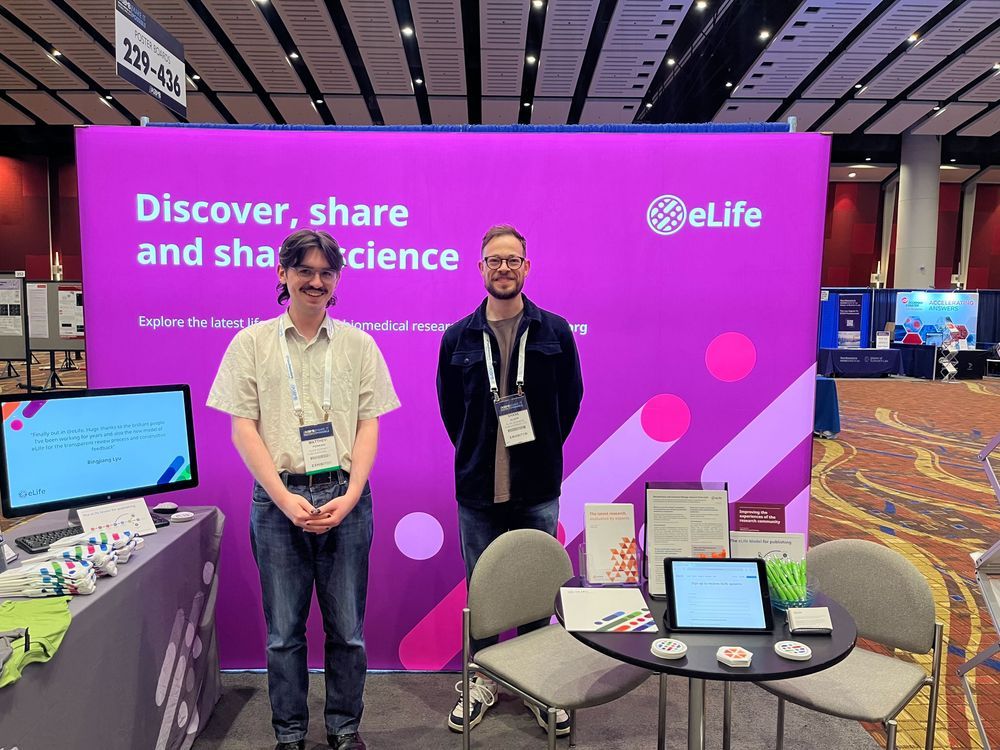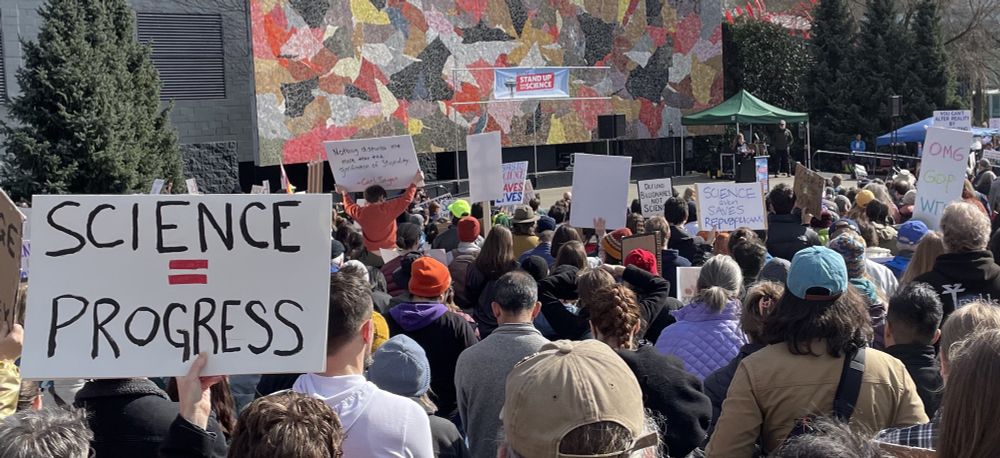Peter Rodgers
@drpeterrodgers.bsky.social
Father, editor [@elife.bsky.social], rower. Views my own
HARSH!!!
One day you are the editor-in-chief of @nature.com
Next, according to @science.org, you are an “Unaffiliated scholar, London, UK”
One day you are the editor-in-chief of @nature.com
Next, according to @science.org, you are an “Unaffiliated scholar, London, UK”

November 7, 2025 at 2:49 PM
HARSH!!!
One day you are the editor-in-chief of @nature.com
Next, according to @science.org, you are an “Unaffiliated scholar, London, UK”
One day you are the editor-in-chief of @nature.com
Next, according to @science.org, you are an “Unaffiliated scholar, London, UK”
AI leads to surge in the number of letters being sent to scientific journals or, as one editor-in-chief puts it - “the mass production of junk”
A rapidly growing share of letters to journals may be drafted by machines, undetected by editors. Study quantifies recently ‘prolific debutante authors’ who had published no letters before 2022, when ChatGPT debuted. #academicjournals #peerreview @science.org www.science.org/content/arti...

Letters to scientific journals surge as ‘prolific debutante’ authors likely use AI
New study reinforces worries about “mass production of junk” by unscrupulous scholars aiming to pad their CVs
www.science.org
November 4, 2025 at 6:00 PM
AI leads to surge in the number of letters being sent to scientific journals or, as one editor-in-chief puts it - “the mass production of junk”
Replication studies meet #metaresarch!!
@vtraag.bsky.social and colleagues at @rorinstitute.bsky.social and elsewhere attempted to replicate two phenomena of interest to ECRs and funders: the Matthew effect and the early-career setback effect.
elifesciences.org/reviewed-pre...; @elife.bsky.social
@vtraag.bsky.social and colleagues at @rorinstitute.bsky.social and elsewhere attempted to replicate two phenomena of interest to ECRs and funders: the Matthew effect and the early-career setback effect.
elifesciences.org/reviewed-pre...; @elife.bsky.social
The Matthew effect and early-career setbacks in research funding—a replication study
elifesciences.org
October 14, 2025 at 6:40 PM
Replication studies meet #metaresarch!!
@vtraag.bsky.social and colleagues at @rorinstitute.bsky.social and elsewhere attempted to replicate two phenomena of interest to ECRs and funders: the Matthew effect and the early-career setback effect.
elifesciences.org/reviewed-pre...; @elife.bsky.social
@vtraag.bsky.social and colleagues at @rorinstitute.bsky.social and elsewhere attempted to replicate two phenomena of interest to ECRs and funders: the Matthew effect and the early-career setback effect.
elifesciences.org/reviewed-pre...; @elife.bsky.social
Webinar about the Brazilian Reproducibility Initiative next Friday.
And you you cannot wait until then . . . .
elifesciences.org/interviews/3...
And you you cannot wait until then . . . .
elifesciences.org/interviews/3...
May 23, 2025 at 12:02 PM
Webinar about the Brazilian Reproducibility Initiative next Friday.
And you you cannot wait until then . . . .
elifesciences.org/interviews/3...
And you you cannot wait until then . . . .
elifesciences.org/interviews/3...
Reposted by Peter Rodgers
How can we fix gender #inequality in #academia in 3 steps? Suggestions from our article in @elife.bsky.social with Gabriella Damasceno, @danielahoss.bsky.social, Alexandra Weyrich, a product of the iDiv Female Scientists initiative www.idiv.de/striving-for...
elifesciences.org/articles/105...
elifesciences.org/articles/105...

Equity, Diversity and Inclusion: Improving gender equity in academia depends on the workplace environment
The authors recommend actions that can be taken by individuals, institutions and policymakers to promote gender equity.
elifesciences.org
April 14, 2025 at 9:50 AM
How can we fix gender #inequality in #academia in 3 steps? Suggestions from our article in @elife.bsky.social with Gabriella Damasceno, @danielahoss.bsky.social, Alexandra Weyrich, a product of the iDiv Female Scientists initiative www.idiv.de/striving-for...
elifesciences.org/articles/105...
elifesciences.org/articles/105...
Reposted by Peter Rodgers
Heading to #ASBMB25? Find us at stand 333 to talk about our publishing model and what we're doing for #OpenScience!
At the stand, you'll find friendly faces Shane Alsop and Matthew Perkins, plus some exclusive eLife goodies. We hope to see you there!
At the stand, you'll find friendly faces Shane Alsop and Matthew Perkins, plus some exclusive eLife goodies. We hope to see you there!

April 14, 2025 at 4:25 PM
Heading to #ASBMB25? Find us at stand 333 to talk about our publishing model and what we're doing for #OpenScience!
At the stand, you'll find friendly faces Shane Alsop and Matthew Perkins, plus some exclusive eLife goodies. We hope to see you there!
At the stand, you'll find friendly faces Shane Alsop and Matthew Perkins, plus some exclusive eLife goodies. We hope to see you there!
Congratulations to the Brazilian Reproducibility Initiative on publishing “Estimating the replicability of Brazilian biomedical science”.
Bottom line: replication rates varied between 15 and 45%
Bottom line: replication rates varied between 15 and 45%
How replicable is Brazilian research? The Brazilian Reproducibility Initiative explores this key question, assessing how well biomedical studies can be reproduced using standard lab methods. Check our preprint 👇
doi.org/10.1101/2025...
doi.org/10.1101/2025...

Estimating the replicability of Brazilian biomedical science
Concerns over the replicability and reproducibility of published research have grown in many research fields, but empirical data to inform policies are still scarce. Biomedical research in Brazil expa...
doi.org
April 9, 2025 at 1:26 PM
Congratulations to the Brazilian Reproducibility Initiative on publishing “Estimating the replicability of Brazilian biomedical science”.
Bottom line: replication rates varied between 15 and 45%
Bottom line: replication rates varied between 15 and 45%
The results from the Brazilian Reproducibility Initiative have been published:
Preprint here: www.biorxiv.org/content/10.1...
In brief, 56 lab performed 143 replications of 56 experiments.
Preprint here: www.biorxiv.org/content/10.1...
In brief, 56 lab performed 143 replications of 56 experiments.

Estimating the replicability of Brazilian biomedical science
Concerns over the replicability and reproducibility of published research have grown in many research fields, but empirical data to inform policies are still scarce. Biomedical research in Brazil expa...
www.biorxiv.org
April 9, 2025 at 10:57 AM
The results from the Brazilian Reproducibility Initiative have been published:
Preprint here: www.biorxiv.org/content/10.1...
In brief, 56 lab performed 143 replications of 56 experiments.
Preprint here: www.biorxiv.org/content/10.1...
In brief, 56 lab performed 143 replications of 56 experiments.
JUST SAY NO!! “Member states and the science community will feel that they are being locked into something like a 70-year mortgage, if they agree to go ahead,” says John Womersley [who is a former UK delegate to the CERN Council]. “Almost no one that I have spoken to thinks this is a good idea.”
Long-awaited report explores the practicalities of building a triple-sized version of the LHC
https://go.nature.com/4iUOjqL
https://go.nature.com/4iUOjqL

CERN releases detailed plans for supercollider — but no hints about funding
Long-awaited report explores the practicalities of building a triple-sized version of the LHC.
go.nature.com
April 2, 2025 at 4:59 PM
JUST SAY NO!! “Member states and the science community will feel that they are being locked into something like a 70-year mortgage, if they agree to go ahead,” says John Womersley [who is a former UK delegate to the CERN Council]. “Almost no one that I have spoken to thinks this is a good idea.”
Reposted by Peter Rodgers
Since the second world war, US economic prosperity and major technological developments have hinged upon the government’s commitment to funding scientific research. The Trump administration is ending that

Are Trump's cuts to science the end of the endless frontier?
Since the second world war, US economic prosperity and major technological developments have hinged upon the government’s commitment to funding scientific research. The Trump administration is ending that
www.newscientist.com
March 28, 2025 at 11:51 PM
Since the second world war, US economic prosperity and major technological developments have hinged upon the government’s commitment to funding scientific research. The Trump administration is ending that
Science Under Threat in the United States
Science is under attack in the US. The new administration is terminating grants, preventing the review of new applications, and firing staff at funding agencies. How should the scientific community respond?
elifesciences.org/collections/...
Science is under attack in the US. The new administration is terminating grants, preventing the review of new applications, and firing staff at funding agencies. How should the scientific community respond?
elifesciences.org/collections/...

Science Under Threat in the US
The new administration in the US is conducting an assault on science and scientists – how should the scientific community respond?
elifesciences.org
March 28, 2025 at 12:31 PM
Science Under Threat in the United States
Science is under attack in the US. The new administration is terminating grants, preventing the review of new applications, and firing staff at funding agencies. How should the scientific community respond?
elifesciences.org/collections/...
Science is under attack in the US. The new administration is terminating grants, preventing the review of new applications, and firing staff at funding agencies. How should the scientific community respond?
elifesciences.org/collections/...
Also very pleased to have published this article by @stuartbuck.bsky.social on how to make science more efficient
#standupforscience
#standupforscience
There is plenty of scope for reducing bureaucracy for the benefit of research, @stuartbuck.bsky.social argues. However, Elon Musk and the Department of Government Efficiency are going about this completely the wrong way.
buff.ly/aLkxKhC
buff.ly/aLkxKhC

March 27, 2025 at 5:52 PM
Also very pleased to have published this article by @stuartbuck.bsky.social on how to make science more efficient
#standupforscience
#standupforscience
Very pleased to have published this article by @abankston.bsky.social on the current situation in the United States
#standupforscience
#standupforscience
@abankston.bsky.social – a science policy fellow at the US House Representatives – outlines some options available for responding to the attacks on science and the scientific workforce in the US.
buff.ly/udqoZI5
buff.ly/udqoZI5

March 27, 2025 at 5:51 PM
Very pleased to have published this article by @abankston.bsky.social on the current situation in the United States
#standupforscience
#standupforscience
Science Under Threat in the United States
A new series of articles in @elife.bsky.social
Two more articles published today – seven articles in total
elifesciences.org/collections/...
#standupforscience
A new series of articles in @elife.bsky.social
Two more articles published today – seven articles in total
elifesciences.org/collections/...
#standupforscience

Science Under Threat in the US
The new administration in the US is conducting an assault on science and scientists – how should the scientific community respond?
elifesciences.org
March 27, 2025 at 11:38 AM
Science Under Threat in the United States
A new series of articles in @elife.bsky.social
Two more articles published today – seven articles in total
elifesciences.org/collections/...
#standupforscience
A new series of articles in @elife.bsky.social
Two more articles published today – seven articles in total
elifesciences.org/collections/...
#standupforscience
Very pleased to have published this article by Nick Gilpin on why the NIH is a sound investment for the US taxpayer
#standupforscience
#standupforscience
1/ NIH-funded research has come under a new level of fiscal scrutiny under Trump, sending shock waves through biomedical research.
As Nick Gilpin writes, at the core of these cuts is one question: Is it a worthwhile investment for the US taxpayer?
buff.ly/qJ8axNe
As Nick Gilpin writes, at the core of these cuts is one question: Is it a worthwhile investment for the US taxpayer?
buff.ly/qJ8axNe

March 27, 2025 at 10:50 AM
Very pleased to have published this article by Nick Gilpin on why the NIH is a sound investment for the US taxpayer
#standupforscience
#standupforscience
Very pleased to have published this article by @mayankchugh.bsky.social and his students
#standupforscience
#standupforscience
My undergraduate students & I have been having discussions about what the current US policies mean for the science, their career aspirations, & public health.
Thank you @drpeterrodgers.bsky.social @elife.bsky.social @elifecommunity.bsky.social
for giving us a space to share our voices & fears.
Thank you @drpeterrodgers.bsky.social @elife.bsky.social @elifecommunity.bsky.social
for giving us a space to share our voices & fears.
Science Under Threat in the United States
The impact on undergraduate students
by @mayankchugh.bsky.social et al
Anti-science policies, funding cuts, scientific censorship and the US withdrawing from international commitments are worrying students.
elifesciences.org/articles/106...
The impact on undergraduate students
by @mayankchugh.bsky.social et al
Anti-science policies, funding cuts, scientific censorship and the US withdrawing from international commitments are worrying students.
elifesciences.org/articles/106...
March 27, 2025 at 12:17 AM
Very pleased to have published this article by @mayankchugh.bsky.social and his students
#standupforscience
#standupforscience
Very pleased to have published this article by @annagreene.bsky.social and @casey.greenelab.com
#standupforscience
#standupforscience
Last year, I was surprisingly diagnosed with AML. Attacks on science that we currently face threaten future scientific discoveries that can benefit individuals' health. This should scare us all. Read more about my story and thoughts on this below (with @casey.greenelab.com).
Science Under Threat in the US
Research turns hope into reality
by @annagreene.bsky.social & @casey.greenelab.com
Two scientists describe how an acute myeloid leukemia diagnosis underscores the need for continued federal support for research and access to care. elifesciences.org/articles/106...
Research turns hope into reality
by @annagreene.bsky.social & @casey.greenelab.com
Two scientists describe how an acute myeloid leukemia diagnosis underscores the need for continued federal support for research and access to care. elifesciences.org/articles/106...
March 26, 2025 at 5:33 PM
Very pleased to have published this article by @annagreene.bsky.social and @casey.greenelab.com
#standupforscience
#standupforscience
Science Under Threat in the United States
A new series of articles in @elife.bsky.social
Five articles published so far
elifesciences.org/collections/...
More articles coming tomorrow
#standupforscience
A new series of articles in @elife.bsky.social
Five articles published so far
elifesciences.org/collections/...
More articles coming tomorrow
#standupforscience

Science Under Threat in the US
The new administration in the US is conducting an assault on science and scientists – how should the scientific community respond?
elifesciences.org
March 26, 2025 at 2:56 PM
Science Under Threat in the United States
A new series of articles in @elife.bsky.social
Five articles published so far
elifesciences.org/collections/...
More articles coming tomorrow
#standupforscience
A new series of articles in @elife.bsky.social
Five articles published so far
elifesciences.org/collections/...
More articles coming tomorrow
#standupforscience
Reposted by Peter Rodgers
1/ Today, we publish the first of seven articles in a series exploring ‘Science Under Threat in the United States’.
The authors discuss what they describe as the Trump administration's "assault" on science and scientists, and what the response should be. #StandUpForScience
The authors discuss what they describe as the Trump administration's "assault" on science and scientists, and what the response should be. #StandUpForScience

March 25, 2025 at 5:13 PM
1/ Today, we publish the first of seven articles in a series exploring ‘Science Under Threat in the United States’.
The authors discuss what they describe as the Trump administration's "assault" on science and scientists, and what the response should be. #StandUpForScience
The authors discuss what they describe as the Trump administration's "assault" on science and scientists, and what the response should be. #StandUpForScience
Science Under Threat in the United States
A new series of articles in @elife.bsky.social
First three articles published today
More articles coming tomorrow and Thursday
#standupforscience
A new series of articles in @elife.bsky.social
First three articles published today
More articles coming tomorrow and Thursday
#standupforscience
March 25, 2025 at 3:07 PM
Science Under Threat in the United States
A new series of articles in @elife.bsky.social
First three articles published today
More articles coming tomorrow and Thursday
#standupforscience
A new series of articles in @elife.bsky.social
First three articles published today
More articles coming tomorrow and Thursday
#standupforscience
Also very pleased to have published this article by @blekhman.bsky.social in the Science Under Threat in the United States series of articles in @elife.bsky.social
Trying to make sense of the current situation, I put together some thoughts in an op-ed for @elife.bsky.social on what we, as scientists, can do – and what institutions MUST do – to protect science right now
elifesciences.org/articles/106...
elifesciences.org/articles/106...

Science Under Threat in the United States: How scientists and institutions should respond
Individual researchers and university leaders need to make the case for science to their elected representatives and to the public at large.
elifesciences.org
March 25, 2025 at 2:47 PM
Also very pleased to have published this article by @blekhman.bsky.social in the Science Under Threat in the United States series of articles in @elife.bsky.social
Reposted by Peter Rodgers
Nice to see the NIH funding crisis finally getting real news coverage. Stories from the last couple of days:
PBS (3/22): www.pbs.org/newshour/sho...
ABC News (3/23): abcnews.go.com/Health/scien...
Wired (3/24): www.wired.com/story/the-ch...
NY Times (3/24): www.nytimes.com/2025/03/24/h...
PBS (3/22): www.pbs.org/newshour/sho...
ABC News (3/23): abcnews.go.com/Health/scien...
Wired (3/24): www.wired.com/story/the-ch...
NY Times (3/24): www.nytimes.com/2025/03/24/h...

The effect of NIH funding cuts on vaccine access and hesitancy research
The National Institutes of Health has terminated dozens of grants for scientific research projects related to vaccine use and hesitancy, informing researchers that their studies no longer aligned with...
www.pbs.org
March 25, 2025 at 1:41 AM
Nice to see the NIH funding crisis finally getting real news coverage. Stories from the last couple of days:
PBS (3/22): www.pbs.org/newshour/sho...
ABC News (3/23): abcnews.go.com/Health/scien...
Wired (3/24): www.wired.com/story/the-ch...
NY Times (3/24): www.nytimes.com/2025/03/24/h...
PBS (3/22): www.pbs.org/newshour/sho...
ABC News (3/23): abcnews.go.com/Health/scien...
Wired (3/24): www.wired.com/story/the-ch...
NY Times (3/24): www.nytimes.com/2025/03/24/h...
The third of today's articles about "Science Under Threat in the United States" in eLife - this time by Nick Gilpin.
There will be another two articles tomorrow and another two on Thursday
There will be another two articles tomorrow and another two on Thursday
By Nicolas Gilpin:
“It is clear that scientific communication by scientists, universities, and research societies must drastically improve.”
elifesciences.org/articles/106...
“It is clear that scientific communication by scientists, universities, and research societies must drastically improve.”
elifesciences.org/articles/106...

Science Under Threat in the United States: The NIH is a sound investment for the US taxpayer
Research funded by the National Institutes of Health is essential for improving the health of Americans and developing new drugs and treatments for a wide range of diseases.
elifesciences.org
March 25, 2025 at 1:26 PM
The third of today's articles about "Science Under Threat in the United States" in eLife - this time by Nick Gilpin.
There will be another two articles tomorrow and another two on Thursday
There will be another two articles tomorrow and another two on Thursday
Another article in @elife.bsky.social about "Science Under Threat in the United States" - this time by @blekhman.bsky.social
Others in this growing collection:
By @blekhman.bsky.social
“Make no mistake: this is not just bad for science – it is bad for America.“
elifesciences.org/articles/106...
By @blekhman.bsky.social
“Make no mistake: this is not just bad for science – it is bad for America.“
elifesciences.org/articles/106...

Science Under Threat in the United States: How scientists and institutions should respond
Individual researchers and university leaders need to make the case for science to their elected representatives and to the public at large.
elifesciences.org
March 25, 2025 at 1:24 PM
Another article in @elife.bsky.social about "Science Under Threat in the United States" - this time by @blekhman.bsky.social
Very pleased to have published this article by @vscooper.micropopbio.org in @elife.bsky.social
My OpEd in @elife.bsky.social
“It feels as if we are trying to fight a series of attacks on science with one arm tied behind our back and our lips half sewn shut.”
“Yet we are not beaten, and some of us are downright energized.”
elifesciences.org/articles/106...
“It feels as if we are trying to fight a series of attacks on science with one arm tied behind our back and our lips half sewn shut.”
“Yet we are not beaten, and some of us are downright energized.”
elifesciences.org/articles/106...

Science Under Threat in the United States: Feeling abandoned but energized
Many individual researchers are frustrated by the response - or the lack of a response - from universities to a growing crisis.
elifesciences.org
March 25, 2025 at 1:23 PM
Very pleased to have published this article by @vscooper.micropopbio.org in @elife.bsky.social

